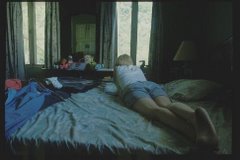Very Like A Whale has a neat post on " Your favorite un-PC children's books." What do you do when you re-read an old favorite, only to find that it's, well, pretty problematic? Weak female characters, racist stereotypes, religious propaganda. Do we let our kids read this? And how did we survive it?
I, for one, am grateful my parents didn't censor my reading. Anything and everything was allowed, however grown-up, or, frankly, objectionable. Maybe that's why I don't worry too much about stereotypes and problematic politics in the literature my kids read. I'm holding out hope that what we learn from reading great books is not so much "manners and customs" or "social norms" as it is, well, empathy - that intangible thing that happens when we step into someone else's story and try to make sense of it. From what I understand, readers tend to identify with the main character of a story, regardless of race, gender, etc. Just as we are the subjects of our own self-narratives, so we place ourselves in the subject position when we read (that's why Indian children watching westerns identify with the cowboys). Our ability to switch between social categories in this process of identification is actually very interesting.
What I would like to spare my kids is the plethora of insipid literature written in the name of social change - those clumsily written stories that have nothing more going for them than that the princess rescues the prince. When it comes to change or progress, I'd wager that politically correct plot-lines have had way less impact on the world than, say, female literacy.
Subscribe to:
Post Comments (Atom)







2 comments:
Nothing is more scary to me than kids growing up with no exposure to other times & other cultures.
I was really distressed when I saw a modern reprint of an Enid Blyton book that had been Americanized. Enid Blyton is no literary titan, but I discovered tyres and kerbs and tins and jerseys by reading the Adventurous Four. And the far deeper, more important lesson that different people can have different names and spellings for things without one of them being wrong. That somewhere I would be a foreigner, and my tires and curbs and cans and sweaters would look outlandish. No insulation from politically incorrect attitudes could be worth depriving kids of that.
My mother used to teach "human factors" to army officers, and one assignment she always gave was to describe their own culture. She would always get a few blank stares, and people who would say, "but I don't have a culture. I'm just a regular guy."
That's the stuff of totalitarians are made of.
Hi Dale,
I so agree. It's a shame how people underestimate kids, and deprive them of so much in the process. I wrote a middle grade children's book a few years back, for a cross-cultural sort of press. The story took place in Pakistan. To my surprise, the editor wanted to Americanize any foreign expressions, e.g. not Ruby Auntie, but Aunt Ruby. I thought, Then what's the point?
Thanks for stopping by.
~Laura
Post a Comment